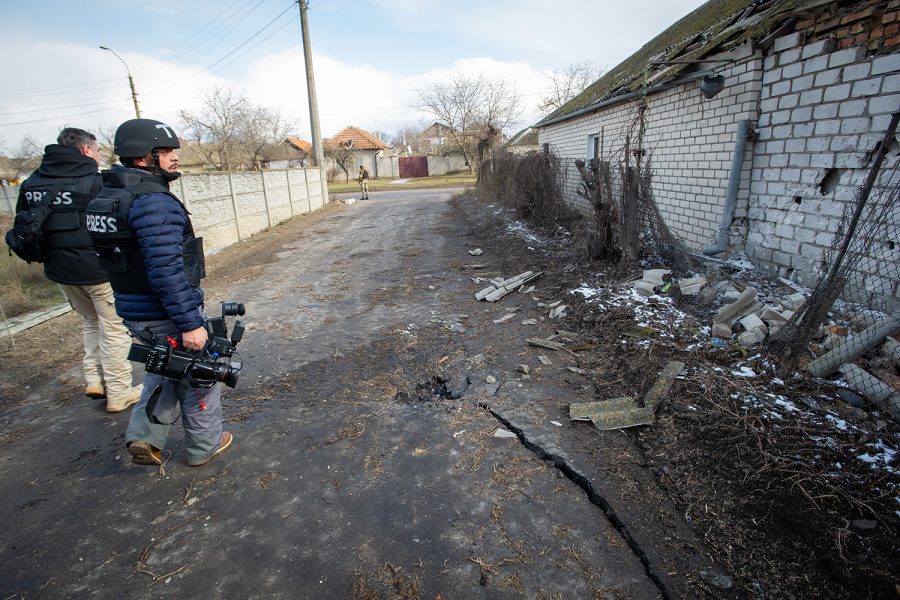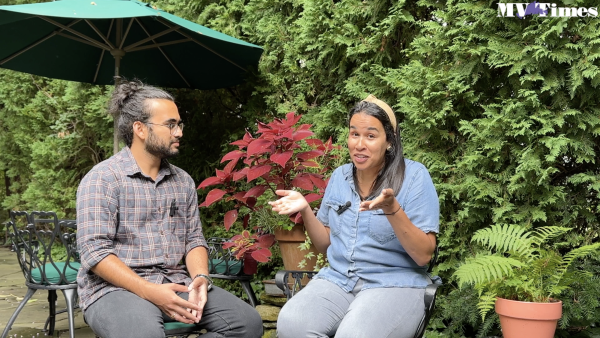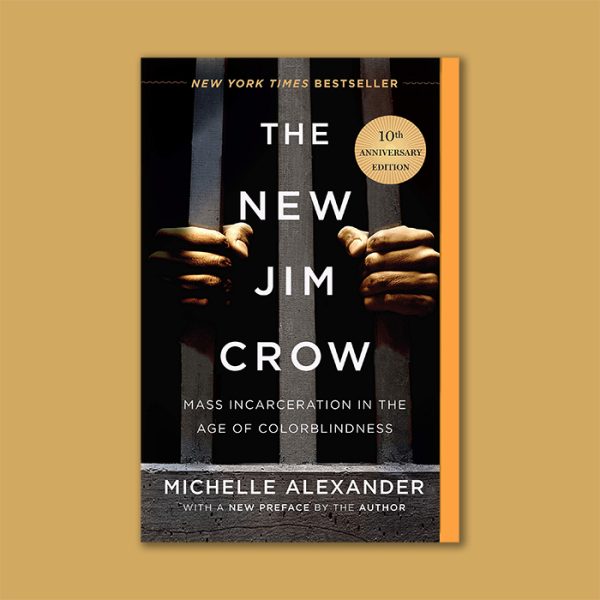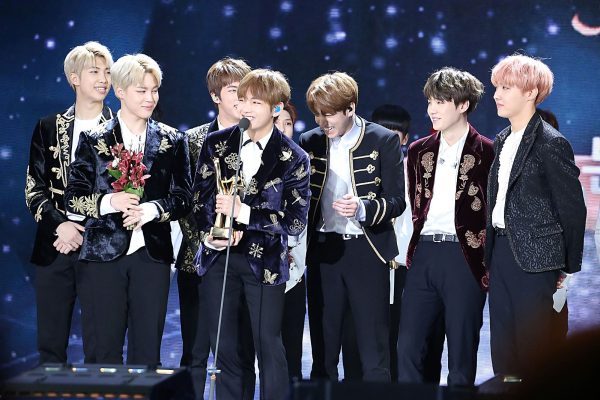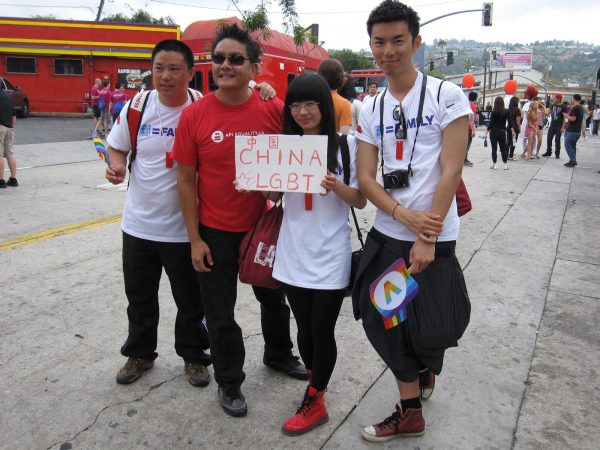Has Reporting on Mass Death and War Become too Casual?
CC: Getty Images / Scott Peterson
A television news team examines the result of a Russian missile strike in a residential neighborhood in the port city of Mykolaiv, Ukraine, on March 9, 2022.
January 30, 2023
It seems that the U.S. has been at war throughout most of history. In fact, it’s been at war for more than 92 percent of the time since its birth as a country in 1776. This includes conflicts that the U.S. has been an active member in and situations of foreign intervention in which the country has tried to intervene, either to combat Communism or just because America felt like it had a duty to police other countries.
Americans are accustomed to consuming war-related news and news of mass death events. After two years of the COVID-19 pandemic, reading or watching a news story that discusses many deaths may not come as a shock to some. In America, specifically, where mass shootings have been extremely frequent, a war in another country across the ocean might not seem like a big deal.
While the role of journalists is normally to shine a light on injustices and corruptions in society, reporting on mass shooting events has been different. Throughout history, press coverage on abuses in American society has led to a change of attitudes and sensibilities with the issue. That is not the case with mass shootings, primarily because of the political polarization in today’s society, specifically regarding the topic of gun rights.
“How many mass shootings have there been in the last month? It’s almost like we expect it, like it’s a part of the normal carnage of American life,” said Charles Fountain, a retired journalism history professor at Northeastern University. “It’s a horrible statement on the American condition that we would accept that in the way that we would accept drug overdoses or traffic accidents or the other kinds of sudden deaths that we see in this country, but we do.”
Continual exposure to news about mass death through the mainstream media and social media has likely dulled Americans’ emotional responses to death, including war. The public may be experiencing war fatigue because there is no clear end to the war in Ukraine in sight. Similar to war fatigue, there are only so many reports of death people are able to read before they decide to stop consuming that news. This sense of fatigue with the war and events of mass death in general could be dangerous in that it may undermine U.S. aid to Ukraine.
Despite an international sense of fatigue regarding all events of mass death, the mainstream media must continue to report on what it identifies as news to keep the public informed.
There are many things to consider when reporting on a long-running event with a large amount of newsworthy information and events of mass death.
When reporting on a horrific and chaotic event such as a war, misinformation and general confusion is often frequent in news coverage. The rapid flow of information can very easily lead to disarray among journalists and news organizations, and misinformation can be published and spread. Also, Russian state-run media has promoted large amounts of disinformation about the war since they invaded Ukraine, which can be difficult to distinguish from what’s true for many.
Social media, though it can be a helpful tool for rapidly spreading information or awareness, can very easily contribute to the spread of falsities that are represented as facts. Young people are especially susceptible to believing false information, and the platform TikTok gives them access to an abundance of information, both true and untrue.
War reporting is a challenging endeavor. Journalists must provide a realistic image of what is happening but must also encourage the public to inform themselves. The media is a powerful tool, and the way news organizations cover events has the power to shape public opinion.
In the case of the war in Ukraine, journalists must be sensitive to war fatigue but also recognize that this is a historically important event that is impacting people right now.
“It seems that most people can adapt immunity to all these terrible events,” said Oksana Pavlenko, editor-in-chief of the Ukrainian online magazine DIVOCHE.MEDIA. “What should the media do? Do keep the war in Ukraine in the focus, tell the stories of Ukrainians. I think this really matters.”
On February 24, 2022, Russia invaded Ukraine. Unlike many other conflicts going on outside of the U.S., American media has frequently reported on the war since it began. The war in Ukraine is on the radars of American citizens, more so than conflicts in the Middle East or Africa. It’s possible that this is because global superpowers are taking sides in this war and, unlike a regional conflict, this could erupt into a global issue.
It is more likely that the war in Ukraine has captured the attention of American citizens and news organizations because societies care more about conflicts they can relate to. Not only is Ukraine geographically closer to the U.S., but its people likely seem more relatable to some Americans than citizens in Ethiopia or Yemen, a prejudiced idea.
Some media organizations have made this offensive and racist comparison. In a CBS News segment, Charlie D’Agata said, reporting from Kyiv, that Ukraine “isn’t a place, with all due respect, like Iraq or Afghanistan, that has seen conflict raging for decades. This is a relatively civilized, relatively European – I have to choose those words carefully, too – city, where you wouldn’t expect that or hope that it’s going to happen.”
This double standard and implicit bias voiced by D’Agata likely exists in the minds of other journalists in mainstream media organizations in the U.S. and throughout the world, so it can be assumed that factor influences the high amount of news coverage the war in Ukraine has received compared to conflicts elsewhere in the world.
“If it’s not in our own backyard, if it’s not involving a place or community that we are identified with, then we just sort of shrug and say, ‘Well, isn’t that a shame,’” said Fountain.
Since Russia invaded Ukraine in February, 2022, American coverage of the war has continued but has gradually slowed and is no longer the biggest headline on news sites. A Ukrainian online magazine has continued frequent coverage of war-related subjects and has been attempting to cover the war in Ukraine in a more personal way, rather than just reporting on the larger events of the war.
DIVOCHE.MEDIA is an online independent women’s magazine based in Kyiv, Ukraine. The project was founded in 2013 by Oksana Pavlenko as a small women’s blog and has grown into an influential media source for Ukrainian women. In addition to writing about Ukrainian women, telling their stories and supporting their projects, DIVOCHE.MEDIA creates a safe space for women to share their experiences.
Since Russia invaded Ukraine, DIVOCHE.MEDIA’s work process and the media they produced transformed, like the lives of all Ukrainian citizens. While news organizations and journalists around the world have attempted to follow and accurately cover the events of the war in Ukraine, Ukrainian news organizations like DIVOCHE.MEDIA had a specific responsibility, not only to keep its own readers informed and set an example for the rest of the world, but to tell the individual stories of Ukrainian citizens that would get lost in the news coverage of the war as a whole.
For almost a year, DIVOCHE.MEDIA has written about Ukrainian volunteers contributing to the war efforts, women who serve in the Ukrainian army and women who were forced to leave their cities and homes due to the attacks from Russia. The online magazine has also launched a project that highlights women’s organizations that help women on various issues, a valuable resource to many Ukrainian women as they have been forced to escape their homes or have experienced trauma and violence.
“It is essential for us to show different experiences of different women and support them all,” said Pavlenko.
DIVOCHE.MEDIA mostly writes for the Ukrainian audience but has written some articles to try to spread information to English-speaking people and news organizations. One specific project was a guide for journalists about how to report on sexual violence that was translated to English and published by Human Rights First. The guide, “How to Responsibly Report War-Related Sexual Violence,” was written by Pavlenko, along with lawyer, writer and human rights activist Larysa Denysenko and Tetyana Troschchynska, editor-in-chief of Hromadske Radio, a Ukrainian news and talk radio station and online media platform. The guide is a resource for journalists to learn how to cover stories of sexual violence sensitively and ethically.
Pavlenko and her colleagues created the guide to responsibly reporting on war-related sexual violence because they believed that it’s important for journalists to report ethically on cases of sexual assault and to always respect the victims’ rights and dignity. This is something for journalists to keep in mind when reporting on any event that may be a sensitive subject, such as war.
As a Ukrainian and someone that has experienced and witnessed firsthand the horrors of the war in Ukraine, Pavlenko can’t imagine how anyone could feel a sense of indifference towards the war.
“I am Ukrainian, and it is impossible for me to lose my sensitivity, because this is my country, my people,” said Pavlenko.
American news reporting on the war in Ukraine has died down significantly since the start of the war, despite the fact that it is still going on. Additionally, the few stories that are still being written on the war in Ukraine are not front-page news and do not appear as the biggest story as they did frequently earlier in 2022. This brings into question how should the big news stories be determined?
News on the war in Ukraine follows the pattern of any ongoing news story. A lack of news from the mainstream media about the war in Ukraine does not signify that it isn’t important and doesn’t necessarily show a lack of compassion from journalists and the media organizations they represent. The media has a responsibility to foster the ebb and flow of news, and continual reporting on an event with no significant updates doesn’t do that. The war in Ukraine is almost certainly the most important historical event occurring right now, but it may not be the most newsworthy.
There are many difficulties and ethical responsibilities involved in reporting on any event of mass death, but there is a specifically heightened sensitivity required when reporting on war. War correspondents have, throughout history, had the difficult job of determining how to balance their professional reporting on events with their human sensitivities to the horrific events they witness. Journalists face many personal and ethical pressures during times of war.
One difficulty with war reporting, specifically in reporting on the war in Ukraine, is protecting sources and information that may potentially put people in danger. Part of a reporter’s job is to determine what must go into an article or story to help readers understand the point they’re trying to communicate and what may be kept out of the story at no cost to the reader’s understanding that will protect the safety of sources of that story.
“It’s a difficult balance, to tell the truth about war without putting people in the middle of that war in perhaps more peril,” said Fountain.
The Society of Professional Journalists (SPJ) has resources for journalists during wartime that give guidelines to deciding what information to include in the news and what to leave out. Additionally, the SPJ tells wartime reporters how to assess the reliability of information. Most importantly, it lists ways to balance the importance and harm of publication, which is something all wartime journalists will have to do and is arguably the most difficult part of war reporting and reporting in general.
The role of journalism has changed within the past decade, in part because of social media. Traditional news journalism such as network news or local and regional newspapers were always a common denominator between people on all sides of the political spectrum. News was how many people got their information, so in a way, it united people. Now, there are many different sources that people receive their information from, so there’s a lack of a sense of community that news used to provide.
“That sort of influence of the press has been diminished by having so many outlets and so many voices, and so many of them preaching a particular point of view and preaching to the preconceived interests, prejudices, sensibilities, however you want to say it, of their audience,” said Fountain.
Press credibility is no longer unquestioned, and while this makes the job of journalists a lot more difficult, it’s important that they’re held accountable because the media has a direct impact on the lives of individuals.
“Every story that a journalist writes, whether it’s on a local zoning board hearing over some citizen petition or whether it’s on the war in Ukraine, every story has human consequence,” said Fountain. “It’s going to affect the lives of the people involved, and I think good journalists have always understood this.”
Fountain believes that the media can’t control how the public is going to react to the news they present, and that the role of journalists is to present each story to the best of their ability and do their best to reassert their credibility in their reporting.
“That desensitization is always going to be in the eyes of the reader or the viewer. All the press can do is keep doing what it has historically done, which is to shine a light into these dark corners, wherever those dark corners are,” said Fountain.
Pavlenko emphasized the importance of remembering the people being reported on as a journalist.
“I think that journalists should always feel responsible for their audience and not forget journalistic principles, especially during the war,” said Pavlenko.

